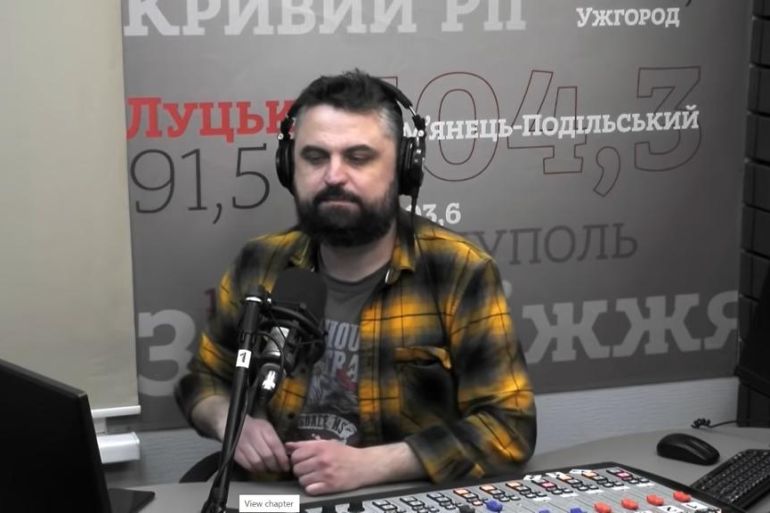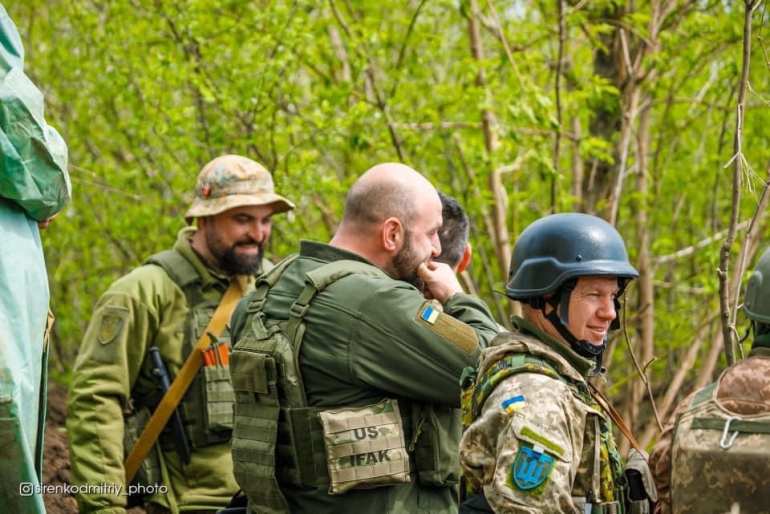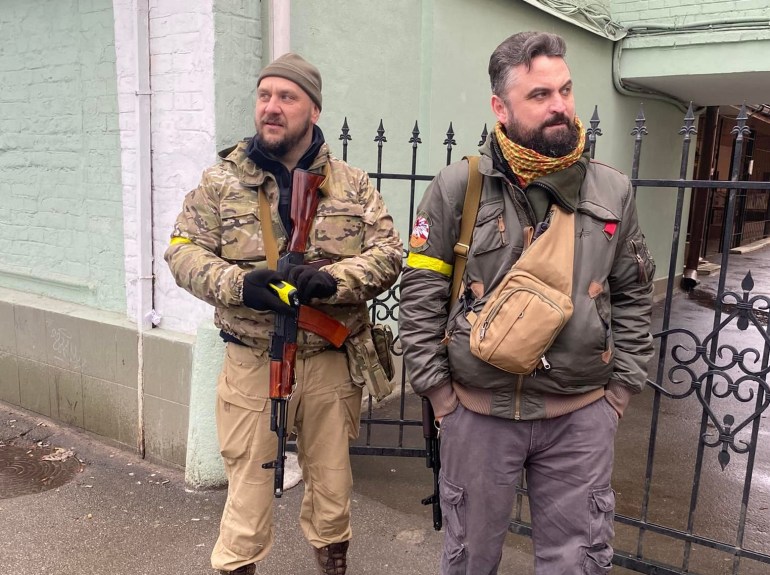Journalist-turned-fighter: I can’t stand aside as Ukraine bleeds
Yuriy Matsarsky was working as a local radio journalist when Russia invaded Ukraine but now fights on the front lines.

On February 25, the second day of Russia’s invasion of Ukraine, Yuriy Matsarsky, a local radio journalist in the capital Kyiv, made a life-changing decision.
As air raid sirens and explosions rang out across the country, he understood that Russia had launched an all-out war, and decided to abandon his role as a messenger and become a fighter.
Keep reading
list of 4 itemsUkraine-Russia latest updates: Moscow slams West for sanctions
‘Never going to happen’: Ukraine blasts trading land for peace
Russia’s invasion of Ukraine: List of key events, day 92
He arrived at a community centre, joined a long queue of volunteers with no military experience, and enlisted in the Ukrainian army.
“I could not find any other useful duty besides joining the army since I couldn’t continue with my profession and live with my daughter and parents, and I volunteered to defend my country,” Matsarsky, 41, told Al Jazeera by phone.
Meanwhile, like millions of other Ukrainians, Matsarsky’s teenage daughter and his parents fled the country, while the radio station he worked at was relocated in 2018 from Kyiv to Lviv, a relatively safer city in western Ukraine.
“I was distressed by the fact that my own family was forced to flee their own country, and I couldn’t continue with my profession due to the Russian invasion,” he said.
“I couldn’t peacefully continue with my normal life. I decided to fight until I get my life and country back.”
Matsarsky’s show on Radio NV was well known and before February 24, he could not have imagined picking up a gun and fighting.
He said he is not alone, and claims that other journalists, including his radio co-host, have joined him at the front line.
Like him, none had basic military training in the beginning.
“We were given some basic training in the first days, and more sophisticated training after the Russian military left the Kyiv region,” said Matsarsky.
He likened the scenes he has witnessed to those from a war movie.
“Huge fields with artillery positions, constant fire, trenches, tanks are moving, and many craters created by shells,” he said.
“I had participated in the war in Kyiv, but now – after the occupiers have been pushed back from the city, I am based in a new position. I can’t tell you the precise location.
“I have seen kids, babies, women and innocent Ukrainians killed by the Russian army. The invading Russian forces are indiscriminately and constantly firing at the town quarters with tanks, artillery and missiles. They are killing everyone.”

When Russia invaded Ukraine, President Volodymyr Zelenskyy banned men of fighting age – those between 18 and 60 – from leaving the country.
Many civilians in Ukrainian abandoned their office jobs and joined the army, but journalists were less likely to fight and probably more inclined to report the world’s biggest story; many local news journalists became war reporters overnight.
“I couldn’t stand aside watching my homeland bleed,” Matsarsky said, when asked about the idea of journalistic objectivity.
“I am defending my country and my life. I am not alone; we have one of the most famous Ukrainian playwrights in our battalion, a biologist lady, my radio co-host and the [imam] from the main mosque in Kyiv. We are all Ukrainians defending their country.”
Carolina Matos, a senior media studies lecturer at City University in London, said journalists in Ukraine were within their rights to act according to the circumstance that has been forced upon them.
“It’s hard for journalists to be fully objective, and if we analyse this case from the perspective of journalism and ethics, it would be the case that this position is not one of ‘neutrality’ obviously, so to speak. So here, the activity of doing professional journalism has been put into question. Nonetheless, the situation is of desperation and frustration,” she told Al Jazeera.
She said media outlets are often unable to cover issues such as “national security”, including war and conflict, in a fair and balanced manner and uphold traditions of objectivity and professionalism.
“The media can often take the government’s side, as was the case with the US war on terror, particularly in the early years with the wars in Afghanistan and Iraq,” she said.
In early May, Zelenskyy confirmed that a Ukrainian television reporter who had enlisted after Russia invaded was killed in fighting outside near the northeastern city of Izyum.
According to Ukraine’s National Union of Journalists, more than 23 media professionals – both Ukrainians and foreigners – have been killed since Russia invaded Ukraine on February 24, the majority of whom died amid attacks.
Still, Matsarsky is ready for combat and aims to liberate his country from the Russian military, including Crimea.
